If you enjoyed these Service Reflections, please forward to other Veterans who may be interested. | |
|
|
|
|
OF An Army VETERAN
Aug 2020
|
|
|
|
|
|
Bellais, William MAJ
|
|
| Status |
Service Years |
|
|
|
USA Retired
|
1953 - 1977
|
|
|
| MOS |
|
|
9301-Tactical Intelligence Staff Officer (G2 S2)
|
|
|
| Primary Unit |
|
|
1976-1977, 2nd Armored Division
|
|
|
|
|
|
|
|
Record Your own Service Memories
By Completing Your Reflections!
|
|
|
Service Reflections is an easy-to-complete self-interview, located on your TWS Profile Page, which enables you to remember key people and events from your military service and the impact they made on your life.
|
|
|
|

|
|
|
|
| |
| |
|
Please describe who or what influenced your decision to join the Army.
|
| |
 |
| My Navy Father-1924 |
My father, Charles E. Bellais, was a career navy man. At first, he served in the Army WWI and joined the Navy in 1923. Initially, assigned to the destroyer fleet, he later served in Naval Aviation during WWII. Retiring after 27 years of active duty, he continued his service in rocketry Point Mugu Naval Missile Test Center and then at White Sands Missle Test Center. I wanted to be like him--a career military man. When an opportunity in high school came to be in the military, I joined the Marine Corps Reserve.
The assistant principal of my high school and Marine Major commanded a new reserve unit, and he was looking for recruits. So I could proudly boast that I did not wait to be drafted or called to duty, I volunteered for active service as a regular Marine. I had a three-year career in the Marines. Because I had been a Marine and later in an Army Reserve military police detachment (CID), I thought my active duty days were over. However, in the summer between my junior and senior college years, I needed another course to fill out my full-time summer class schedule.
I had parked my car across from the Army ROTC building during class registration, and before me was the answer to my dilemma. I said to myself, "Aha, that's it, I'll enroll in ROTC." Having active service on my record meant I did not need to enroll in the basic courses, so the Army ROTC advanced courses seemed to meet that need for extra hours. The ROTC program at New Mexico State University was offering two twelve-week sessions to complete a year of advanced ROTC; I signed up. This decision was an impulse that changed the course of my life. I had no intention of an Army career.
At the time, the Army was offering a program of six-month service for new reserve officers. Planning to serve six months and then go to graduate school and begin a civilian career. All my plans changed when commissioned; I was surprised by my orders? I was assigned to the Signal Corps with an Army Intelligence Specialty and for two years of active duty. As a new 2Lt, I found that being a leader required more from me than all other military experiences. Exhilarated, a career in the Army seemed promising.
|
| |
|
Whether you were in the service for several years or as a career, please describe the direction or path you took. What was your reason for leaving?
|
| |
 |
| MACV Headquarters, 1968 |
I began my military service in the Marine Corps reserve (51st Spec Rifle Co, Port Hueneme, CA, 1952-1953). I wanted to be an active duty Marine, so I transferred to the regular Marine Corps in 1953. The next three years included: boot camp at MCRD, San Diego, advanced infantry training at Camp Pendleton, CA and then assigned to the 3rd Mar Div in Japan, where I was a combat correspondent, and then to the 1st Mar Div in Korea and Camp Pendleton, where I also worked as a combat correspondent. My final rank was Sargeant (E4). I left the Marine Corps in 1956 to attend college on the Korea GI Bill.
Dissatisfied with being out of uniform, and because there was no Marine reserve unit nearby, I joined an Army reserve MP Det (CID) in Las Cruces, NM. In that unit, I was a photography instructor and the detachment clerk. I was discharged with an SP4 rank from the reserve when I accepted a commission in the Army in 1960.
Initially assigned to the Signal Corps (AIS), but my first MOS was 1542, small unit leader, earned after completing training at the Infantry School, Fort Benning, January 1961. From there, I went to the Intelligence School, Fort Holabird, MD, for the basic intelligence officers course. In April 1961, I was assigned to the Intelligence School and worked in the Office of the Director of Instruction, where I was the project coordinator for MAAG, Mission, and Attache Programs and also the leader of the post's NBC platoon.
Orders thwarted my plans to apply for more training at the intelligence school to Fort Richardson, AK. I posted to the G2 section from 1963-1966. Because I had been working in intelligence production, the MI Branch decided I needed more experience, and I reported to the Defense Intelligence Agency in 1966.
Two years later, with a break for the MI Advanced Course, before deployment to Vietnam in 1968, I was enrolled in the Defense Language Institute (Vietnamese), Fort Bliss, TX. My duties in Vietnam were in the J2 Exploitation Section. My responsibilities were overseeing and reviewing interrogations of POWs and those rallying to the RVN cause. Having much experience in intelligence collection sent me to the Navy. In 1969 I was posted to the Naval Amphibious School, Coronado, CA, as an instructor and head of the intelligence department.
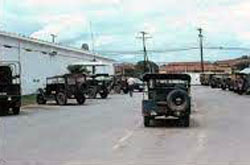 I returned to Vietnam in 1971 to work in the Combined Intelligence Center, Vietnam (CICV), where I served as the assistant chief of the lines-of-communications section and then the Chief of Operations and support. In 1972 I had the opportunity to work in counterintelligence. The new career move began with training at the intelligence school at Fort Huachuca, AZ, and then to the Defense Investigative Service's (DIS) field office in Little Rock, AR, where I was the Special Agent in Charge. The DIS began to employ more civilians and reorganization processes in 1976, requiring my reassignment. From Little Rock, I went to Fort Hood, where I was assigned to the 2nd AD, initially the deputy G2 and then chief of operations security. I retired from active service on October 31, 1977. I returned to Vietnam in 1971 to work in the Combined Intelligence Center, Vietnam (CICV), where I served as the assistant chief of the lines-of-communications section and then the Chief of Operations and support. In 1972 I had the opportunity to work in counterintelligence. The new career move began with training at the intelligence school at Fort Huachuca, AZ, and then to the Defense Investigative Service's (DIS) field office in Little Rock, AR, where I was the Special Agent in Charge. The DIS began to employ more civilians and reorganization processes in 1976, requiring my reassignment. From Little Rock, I went to Fort Hood, where I was assigned to the 2nd AD, initially the deputy G2 and then chief of operations security. I retired from active service on October 31, 1977.
Before fully retiring, the Bureau of Indian Affairs (BIA) accepted my application to be the Senior Army Instructor for the Junior ROTC Program at Wingate High School, Fort Wingate, New Mexico. I served in that program from 1977 to 1979. While in NM, I was invited to join the NM State Guard and commissioned by the governor and commanded 4th New Mexico Cavalry Regiment, 1st New Mexico Cavalry Brigade, from 1979 to 1981. I retired with the rank of colonel. After more than 26 years of military duties, It was time for me to retire and put my uniform away to pursue other interests.
|
| |
|
If you participated in any military operations, including combat, humanitarian and peacekeeping operations, please describe those which made a lasting impact on you and, if life-changing, in what way?
|
| |
 |
| Alaska Earthquake, April 1964. |
A quick response to the victims of the Alaska Earthquake,1964. My section in G2 maintained excellent data on terrain, lines of communication, and demographics. The Army in Alaska saved many lives during this natural disaster. It is probably my proudest moment in the Army.
|
| |
|
Did you encounter any situation during your military service when you believed there was a possibility you might not survive? If so, please describe what happened and what was the outcome.
|
| |
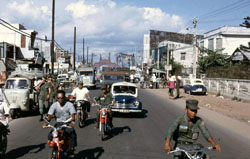 |
| Leaving the Tan Son Nhut AFB in Vietnam 69 |
This event happened in Tan Son Nhut region in Vietnam during the first morning of Tet 1969.
That morning I boarded a bus with about 60 other officers living in the Missouri BOQ. The bus loaded, it pulled out of the compound taking the officers--mostly field grade--to our duties at MACV headquarters. I was seated in the back of the bus on the right side. Going down a narrow street, about 50 yards from the gate of the compound, I observed two men riding on a motorcycle approaching the bus.
My first thought was they were going to be crushed; the large vehicle and a massive tree on the side of the road allowed the little space for the driver to maneuver the bus. The bus driver slowed down at that point as I watched one of the men on the motorcycle reach up and hook something on the screen on the window--I presume they were added to prevent VC from throwing an explosive device through the window.
A Naval officer sitting at the window saw what was happening and began to dislodge the device from the screen. He was having some difficulty removing the explosive from the screen but finally dislodged it. It seemed like several minutes, but it was only seconds before ejecting the bomb. Falling to the ground and under the bus, we still were not out of danger.
The bus driver stepped hard on the accelerator, trying to make the bus jump. He was just seconds from the bomb going off. I was able to look the two men in the.face as they attempted to kill all of the men on the bus. As the bus began its acceleration, I looked out the back window and saw the bomb explode.
Fortunately, it was early morning, a pho cart fell on its side, sending hot soup along with charcoal fire all over the road. I don't know what happened to the pho vendor.
|
| |
|
Of all your duty stations or assignments, which one do you have fondest memories of and why? Which was your least favorite?
|
| |
 |
| G2, USARAL 1963 (l-r) PFC Otilge, MSG Lakin, me, MSG Williamson, SSG Woodrum |
Fort Holabird: I enjoyed living in Baltimore. The assignment for a second lieutenant was challenging. I was in charge of the training material for MAAGs, Missions, and Attaches. My role was to declassify the material, put it in a usable format, and then ship it to MAAGs, Missions, and Attaches who wanted to use the material. Additionally, at this assignment, I was able to work with the Strategic Intelligence School in Washington, D.C. For me, this was a good way to begin a career. U.S. Army Alaska was a very good assignment. There during the Great Alaska Earthquake of 1964. My office had collected the most comprehensive data on Alaska infrastructure and was able to be of important assistance to the people of Alaska.
I wouldn't call it the worst, but my Pentagon assignment had me buried deep in lower levels of the building; rarely saw daylight during hours of duty. This post required me to deliver classified material to the Secretary of Defense and various deputy and assistant secretaries of defense. I also worked with the Office of Joint Chief of Staff and the Joint Reconnaissance Center. Being a courier, regardless of the opportunity to brush up next to power, was not very exciting.
Probably the worst assignment was the Combined Intelligence Center, Vietnam (CICV). My duties there included the assistant head of the Lines of Communication Section and Chief of Operations and Support. The Center's personnel included both U.S. and ARVN as well as civilian employees. The leadership of the Center, two Marine officers, badgered the Army personnel so badly, we lost all respect for them. The two Marines, so full of hubris, apparently believed Army officers were so inferior they needed minute-by-minute supervision. When it came time to return to the U.S., I couldn't have been more relieved.
|
| |
|
From your entire military service, describe any memories you still reflect on to this day.
|
| |
|
 Viet Cong attacked facilities all over the Tan Son Nhut area during the Second Tet Offensive in February of 1969. On the bus, required to ride most mornings, when early on February 12th, it was attacked by Viet Cong. My place on the bus was right in line with two VC riding a motorcycle from which they attached a bomb to the bus. On that day, I looked squarely into the face of the enemy and knew I would not survive. Fortunately, another person saw the bomb, attached to a window screen, and was able to dislodge the device before detonation. It was a very close call of mere seconds. Viet Cong attacked facilities all over the Tan Son Nhut area during the Second Tet Offensive in February of 1969. On the bus, required to ride most mornings, when early on February 12th, it was attacked by Viet Cong. My place on the bus was right in line with two VC riding a motorcycle from which they attached a bomb to the bus. On that day, I looked squarely into the face of the enemy and knew I would not survive. Fortunately, another person saw the bomb, attached to a window screen, and was able to dislodge the device before detonation. It was a very close call of mere seconds.
I thought from the beginning of my tour that year that riding buses to duty stations was a stupid idea. That day proved my point. My preference would have been living in tents behind MACV headquarters than living in exposed BOQs. I made this event an important part of a book I wrote about Vietnam in 1969. Much of the story takes place around the Missouri BOQ, where I housed, and in the J2 Intelligence Operations Tank. I titled the book "An Owl among the Ruins."
|
| |
|
What professional achievements are you most proud of from your military career?
|
| |
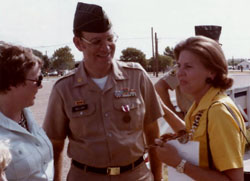 |
| MSM, 2nd AD 1977. Wife Ann (L). Mrs. Patton, (R). |
Bronze Star:
Developed practices to assure the validity of intelligence collected. Worked in the field to support combat units in POW/Hoi Chanh interrogations. Field operations to retrieve intelligence data and captured material. I also received the Joint Service Commendation Medal for my work during this same period. RVN Staff Honor Medal First Class: Had an excellent working relationship with the ARVN counterparts at the Combined Intelligence Center, Vietnam (CICV). My work with them was better than the director of the center, who did not have a good liaison with the ARVN director. All liaison matters were carried on through me. Also, I was often called on to settle disputes and personal issues between US and ARVN personnel.
Army Commendation Medal, US Army Intelligence School, for work on special instructional programs and civic-minded service as Scoutmaster of the Fort Holabird Boy Scout Troop. Army Commendation Medal (Oak Leaf Cluster): US Army Alaska. Support provided during the Great Alaska Earthquake, 1964.
Meritorious Service Medal: 2nd Armored Division. Developing and executing a successful operations security program and the efficient process for handling security clearances for the division.
|
| |
|
Of all the medals, awards, formal presentations and qualification badges you received, or other memorabilia, which one is the most meaningful to you and why?
|
| |
 |
| Working Conditions weren't perfect. |
The Bronze Star awarded after completion of my first tour in Vietnam (1968-1969). I was awarded this decoration for the effort to assure the timely flow of interrogation intelligence. It was difficult work, and I often angered division G2s by insisting that interrogation information not be held to closely but shared with command at MACV on a timely basis. The response to the division G2s was that we would do the same in a reverse direction.
I am very proud of the Staff Honor Medal awarded to me by the Army of the Republic of Vietnam at the Combined Intelligence Center, Vietnam (CICV). Working with Vietnamese counterparts required diplomacy, respect, and a willingness to listen. I had a difficult time with the U.S. Director CICV, my immediate superior, because he had no patience with the ARVN, and I had to go to the Vietnamese Director to smooth out the rough patches. Further, I was called on to deal with men who had gotten in trouble with local Vietnamese authorities and civilians who had complaints concerning American personnel behavior. The result of my work was relations between American the Vietnamese personnel greatly improved.
|
| |
|
Which individual(s) from your time in the military stand out as having the most positive impact on you and why?
|
| |
 |
| One of many contacts In-Country. |
Colonel Falwell was the G2 at US Army, Alaska, and later the Commandant of the Army Intelligence School at Fort Holabird. He gave me much responsibility when I was a first lieutenant, and then at Fort Holabird when I was in the Intelligence Officers Advanced Course he encouraged me to apply for Regular Army Commission.
Colonel Godwin was a major influence on me also. We met at Fort Holabird when he was a Major. He later took command of the Intelligence Detachment in Alaska. I was actually assigned to his unit but served in the G2 section. Colonel Godwin had been close friends. We enjoyed each other's company, I was his sons' Scoutmaster, and we liked living in Alaska. The last time I saw him was at the Republic of Vietnam Joint Military Command Headquarters in Tan Son Nhut, where he was the intelligence division advisor.
LTC Stretch who was the head of the Lines of Communication Section, CICV. We had a great rapport, and he recommended me for the chief of operations at CICV.
Finally, Major General George S. Patton III. I was his security officer in the Second Armored Division. At first, I was a leery about serving with him. I had heard he was a great deal like his father, which was true, but I found him thoughtful and easy to work with. We became friends as much as a major, and two-star general can be friends. We were in the same Episcopal congregation at Fort Hood, Texas. He helped me keep a good sense of humor, morale, and a sense of purpose in my last 16 months in the Army.
|
| |
|
Can you recount a particular incident from your service, which may or may not have been funny at the time, but still makes you laugh?
|
| |
 |
| General Patton - Vietnam |
After the bus attack during Tet 1969, a fellow officer asked me what the color of my underwear was. I had remained calm during the attack but had the jitters afterward, and I was heading out for R&R in two days. I never told my wife about this event for several years.
After awarding the Army Meritorious Service Medal, MG George S. Patton III literally picked me up by my shoulders, shook me and said, "Bellais, if there's ever anything you need, let me know." Then, later in the same day, at a reception for me to honor my service at retirement, Patton saw my 16-year-old daughter, who was and is quite attractive, and said, "Bellais, does she really belong to you? You're so ugly."
|
| |
|
What profession did you follow after your military service and what are you doing now? If you are currently serving, what is your present occupational specialty?
|
| |
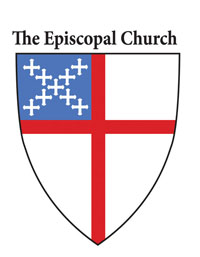 |
| The Episcopal Church |
After retiring, I worked on a Master of Arts degree in clinical counseling. After earning that degree, my first job was Director of Veterans Programs at New Mexico State University. Finding work in student personnel administration interesting, I continued post-Masters studies and worked as a financial aid counselor and then as a student employment development specialist. Finally, I employed at New Mexico State as Assistant Alumni Relations Director.
On earning the Doctor of Education Degree, I was employed by the Kemper Military School and College as a counselor for middle and high school students. College counselor and instructor in psychology, sociology, and religion. I also acted as the school's chaplain.
In 1983 I completed studies for ordination in the Episcopal Church. I served as a Deacon providing counseling services, aid to indigent and transients, and ministry to the sick and elderly. In 1992 I became an ordained priest in the Episcopal Church and served from that time to 2009 three parishes in Missouri. Currently, I am retired from parish ministry but continue to serve as a supply priest in North Central Missouri.
|
| |
|
What military associations are you a member of, if any? What specific benefits do you derive from your memberships?
|
| |
 |
| Staying close to my Career after Retirement. |
I wish I could be more active in the groups to which I belong, but I strive to stay current with their activities. I am a life member of the Military Officers of America Association, Counterparts, Veterans of Foreign Wars, the American Legion, and Disabled American Veterans.
I have been a supporter of the Vietnam Memorial Education Center and the National Army Museum at Fort Belvoir. I belong to the World War I Historical Association and the National World War I Museum in Kansas City, Missouri.
The primary benefit I receive from membership in these organizations is staying in touch with my military past. The major benefit, however, is helping these organizations speak out for veterans and their support for veterans' issues. My support and membership with the memorials and museums help keep our history alive and is the repository of my history as a soldier.
|
| |
|
In what ways has serving in the military influenced the way you have approached your life and your career? What do you miss most about your time in the service?
|
| |
 |
| Get Educated. That's the key to success!!! |
My military career helped me remain disciplined in personal matters and in the manner in which I approached advanced education and my work as a parish priest. Because of my military service, I became a mental health counselor and worked mostly with veterans of the war in Vietnam. Not only could I relate to their situations and help them deal with the issues resulting from serving in Vietnam, but I also had the discipline to allow them to talk without offering "free" advice. I had the drive to be a very vocal advocate for veterans at the Veterans Administration and state agencies making decisions about the validation of course work in veterans' education programs.
Later, I became a counselor and chaplain at a military school and college in Missouri. All my skills and emotions were tested at the school. Still, my military background, both as an enlisted Marine and an Army officer, helped me immensely: first, by staying physically fit to meet the demands of working with young students, second, by demonstrating that a disciplined life leads to success, and third by demonstrating that tenacity is essential to success in school and life.
A soldier, in my view, is a motivated individual, and I have always had the motivation to achieve and be accomplished. After I left the military school, I was called into parish ministry. This occupation was also demanding. The discipline of soldiering helped me stay focused, move toward an objective, and to be totally dedicated to my calling. Finally, I was a hospice chaplain for five years. The discipline of an Army life also helped me successfully deal with very trying sad situations. My military life set the standards of service for me.
|
| |
|
Based on your own experiences, what advice would you give to those who have recently joined the Army?
|
| |
|
 Stay focused on the present, plan for the future. Do not allow present issues to define you. They will pass away. There's always tomorrow. Be proud to serve in uniform, it represents your country as much as the flag does. Seek advancement. Learn to lead by imitating good leaders. Make certain that you keep your eye and your mind on the missions assigned. Stay focused on the present, plan for the future. Do not allow present issues to define you. They will pass away. There's always tomorrow. Be proud to serve in uniform, it represents your country as much as the flag does. Seek advancement. Learn to lead by imitating good leaders. Make certain that you keep your eye and your mind on the missions assigned.
Take time to learn a new skill or develop a deeper understanding of the world around you. Be aware of current world situations. Learn a foreign language. Stay fit both physically and mentally. Always seek help when you don't know something or don't understand. Be patient. Stay out of political discussions. The military services of this country are apolitical. Vote, but don't espouse a political point of view other than service to the nation.
|
| |
|
In what ways has TogetherWeServed.com helped you remember your military service and the friends you served with.
|
| |
|
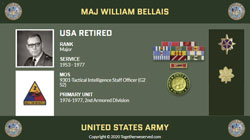 So far, I have trouble remembering names (with a few exceptions). Maybe some connections can be restarted. I would like to hear from people who served, especially in CICV. So far, I have trouble remembering names (with a few exceptions). Maybe some connections can be restarted. I would like to hear from people who served, especially in CICV.
|
| |
| |
|
|
|
| |
Get Started On Together We Served
Watch our video and see what TWS is all about
|
| |
|

|
| |
|
|
|
|
|
|